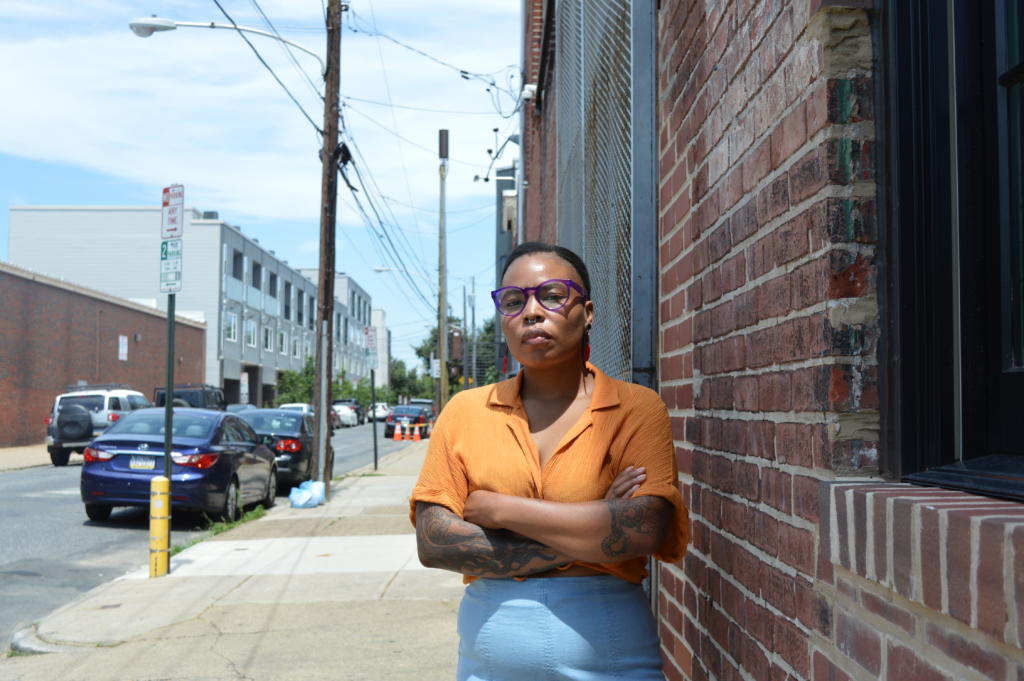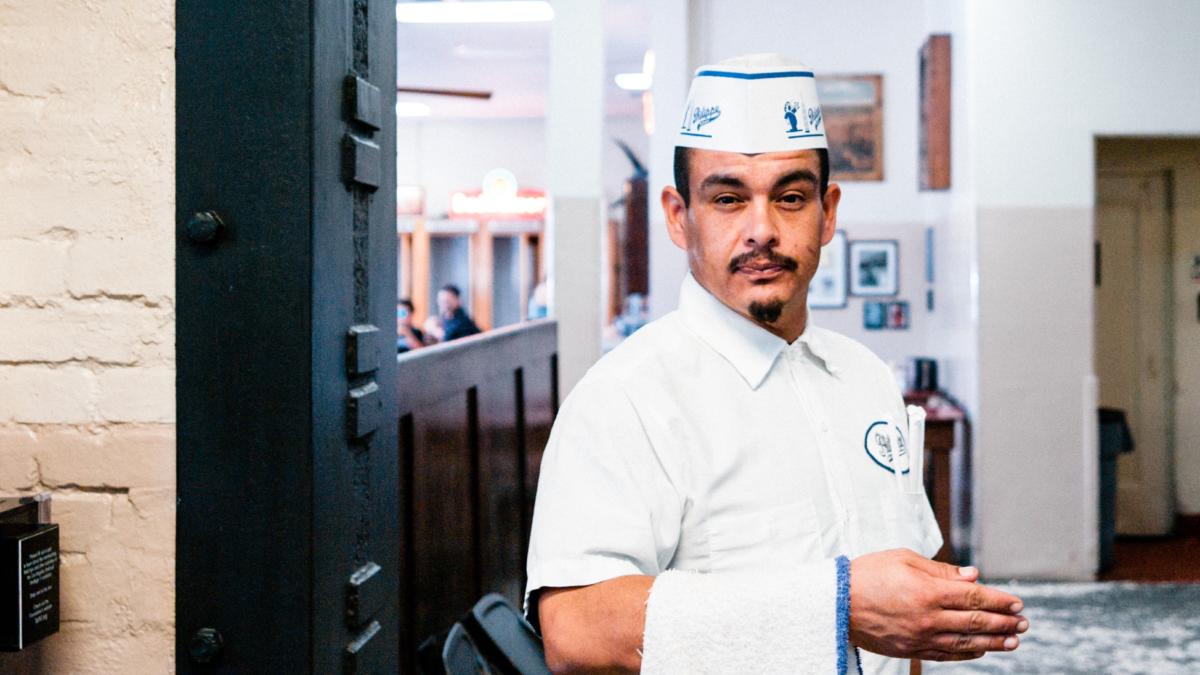For nearly a decade, Iman Servance made herself a life in the fast-paced world of New York City’s food industry and the scene that comes along with it.
Most days found Servance, 31, boarding a train to take a near hour and a half journey from her home in Cliffside Park, New Jersey, to work bartending shifts at The Ribbon, a posh eatery on Manhattan’s Upper West Side. The tips were great and allowed her to benefit from the restaurant’s health plan. But it soon became a rollercoaster of uncertainty, exacerbated by patrons still coming in through The Ribbon’s doors nightly as COVID-19 started to become more and more a reality.
When The Ribbon closed its doors and the subsequent shutdown of New York’s non-essential businesses ensued, Servance made the decision to pursue a new career path and give up the industry life. She now realizes her decision, while difficult arrived at the perfect time considering many tipped workers are not only feeling the effects of dwindling tips and paltry base pay, many establishments are not offering any additional hazard incentives for hundreds coming in contact with thousands venturing out to partly opened tables.
“It was a personal decision but I will say it was a hard decision just because I do know the kind of money that I could make from bartending,” Severance, 31, said. But it’s just not worth it to me. The contact with so many people, who don’t always follow precaution, the riskiness and the fact that I feel like we still don’t really know all the ways people can [contract COVID-19]. I just think the risks are too strong; in the end, it’s not that beneficial for me.”
The decision Servance was forced to make is one facing thousands of tipped workers, specifically those in the food industry. As it stands today, the federal sub-minimum wage for restaurant workers is $2.13 an hour, with New Jersey and New York being one of 43 states that adhere to that wage and Manhattan arriving as one of the cities in which hardly any of its dining establishments – including those in fine dining – barely go beyond $5 an hour in base pay.
That level of base pay alone isn’t enough to afford the restaurant’s healthcare plan in many establishments in New Jersey, a plan that many eateries don’t even offer its service staff until months later – even during the pandemic.

Also, since the restrictions have eased and people have slowly started to hit establishments again, tips for servers have actually decreased, making a need for either a higher base hourly rate or even hazard pay a standard. One Fair Wage, an organization advocating for the rights of tipped workers, estimated that gratuities are down 75-90% nationwide, and workers on lower base salaries don’t even make enough to qualify for unemployment.
To make matters worse, this typically affects a disproportionate amount of women and people of color, who according to data from One Fair Wage, make on average $5 less than their white male counterparts. In that, customer and employer racism in addition to sexism all play a significant role in what tipped workers take home.
“Our research spells it out: Black women who are tipped workers are making less in tips than their white male counterparts by as much $7-8 an hour in places like New York and New Jersey, and the same type of inequity is happening in communities across the United States,” said One Fair Wage president Saru Jayaraman. If we want racial justice, we need wage justice for Black communities [and for communities of color].”
‘It’s like COVID-19 doesn’t exist’
Adesola Ogunleye will be the first to tell you that after working in the foodservice industry for over 15 years in both parts of South Jersey and in Philadelphia, there’s not much that comes as a surprise anymore.
Whether it’s been dealing with multifaceted personalities of the patrons at the front of the house, while dealing with management styles in the back, being immersed in the brotherhood that is Philadelphia’s industry scene has been something Ogunleye has held a passion about.
So when she accepted a job at Laser Wolf in Philadelphia’s Fishtown section, she thought she struck gold. Good dining, close to home, a new establishment with a solid menu and fresh ideas. Not long after it opened its doors, Laser Wolf was forced to close them due to mandatory closures of businesses determined as non-essential. For three months, Ogunleye, who is a DACA recipient, didn’t even know if she qualified for unemployment compensation benefits and was forced to rely on the good graces of others to get by.
So when Laser Wolf announced its reopening earlier this summer and Ogunleye was called back to work, despite not knowing what to expect, the call felt like a welcomed return to some semblance of normalcy.
Her return would last the weekend before she made the decision to call it quits.

“People were out here behaving like COVID-19 [doesn’t exist],” Ogunleye said. “You have to remind people to wear a mask when you got to the table and people were staying like two hours past closing, I’m sorry this is just not the time to be doing that.”
To exacerbate matters for Ogunleye, her Type 2 Diabetes status meant she was in an immunocompromised state and catching COVID-19 from one mistake could be disastrous for her – perhaps even fatal.
“I’m Type 2 diabetic, which really weakens your immune system very, very, very badly,” she said. “It’s harder to heal from just about everything. If you got a cold, you might be over it in let’s say three or four days. I have had simple colds for two weeks, three weeks sometimes. My managers at Laser Wolf were great and understanding, I just couldn’t risk my health, even though, yeah, I could really use the money, right now.”
The struggle isn’t unique to Philadelphia, in fact in New Jersey, New York and in other states nationwide, people in the industry have been speaking out about the unrealistic pay and the lack of a solution from restaurateurs who need these staff members to stay afloat.
People like Ogunleye, who recently created a forum called Be Wary for industry workers to vent about the current state of the restaurant scene. In it are multiple accounts of unfair treatment at the hands of both restaurant management, staff and patrons who frequent some of the top restaurants in the city.
A recurring theme is low and sometimes even missed wages along with the improper wearing of personal protective equipment.
“What I’ve noticed from this and other industry subgroups on Facebook is that a lot of people are just afraid to speak up,” said Ogunleye. “Not only could it mean their job, but a lot of these managers know each other from other restaurants. It’s a small city and an even tighter industry, and being blackballed is a real thing.”
Small steps for big change
Perhaps this is why many people are afraid to speak out and are hoping that their plight gets noticed by officials, who can actually spark change. One official, in Philadelphia City Councilmember Helen Gym, made the plight of low-wage workers a mission of hers to correct. Earlier this year, Gym helped introduce the Fair Workweek law, which is supposed to force Philadelphia’s establishments to provide better pay and more stability in work schedules.
“This pandemic has shone a clear light on how unacceptable the poverty wages in the food industry have been,” Gym noted via email. “Look, $2.13 is a poverty wage, not a living wage. It wasn’t an acceptable wage when it was established as a means to undercut tipped workers, and it is not today. Clearly, when 80 percent of food service workers don’t have or cannot afford health insurance, things need to change – and fast.”
It’s tough to ask struggling restaurant ownership groups to adopt the same policies unless it was largely enforced, and right now many groups are trying to figure out how to survive amid the pandemic. Seasonable temperatures have allowed for outside seating and subsequently a way for many establishments to turn a profit, but at the time of this report, there is no solution for what restaurants will do once fall months turn into colder temperatures and restrictions on indoor dining are enforced.
“People were out here behaving like COVID-19 [doesn’t exist]. You have to remind people to wear a mask when you got to the table and people were staying like two hours past closing, I’m sorry this is just not the time to be doing that.”
– Adesola Ogunleye, former server in South Jersey and Philadelphia and creator of the Be Wary forum for food industry workers
So could things get worse before they get better for tipped workers, especially black and brown workers already feeling the effects of racial inequities in the restaurant industry? It’s possible.
On a level in both New Jersey and New York, both states profit immensely from the foodservice industry, specifically the table service segment. In New Jersey, every dollar spent in the table service segment contributes $1.85 to the state economy, a reported $18.1 billion in revenue in 2019. In New York, were Servance worked, it’s a gold mine with $1.76 going to state coffers per dollar spent to the tune of a reported $51.6 billion, according to data compiled by the National Restaurant Association.
So with benefits to restaurants and the states they operate in being color agnostic, it benefits public officials to create change since change would only benefit additional funding for a host of initiatives.
“I support [any] campaign to bring all food industry workers up to $15 an hour, especially those in the back of the house who are often at the $7.25 minimum,” reiterated Gym.
For Servance, her request is small but direct to both patrons and owners of the establishments they frequent.
“People in the service industry do this because they love it,” Servance said. They love food, they love interacting with people but they also should feel safe. So if people could just follow protocol and guidelines when they go out and not forget that we’re living in a pandemic that’d be a start. Also, many restaurants are bringing back a limited staff and so I think that opens the door to pay people a living wage. It’s better for staff retention and people realize that yeah, they’re risking their lives but at least they’re respected for doing so. It’s not much, but it goes a long way.”
This story was produced as part of a four-month COVID-19 reporting fellowship with NJ ethnic and community media organized by the Center for Cooperative Media at Montclair State University.





